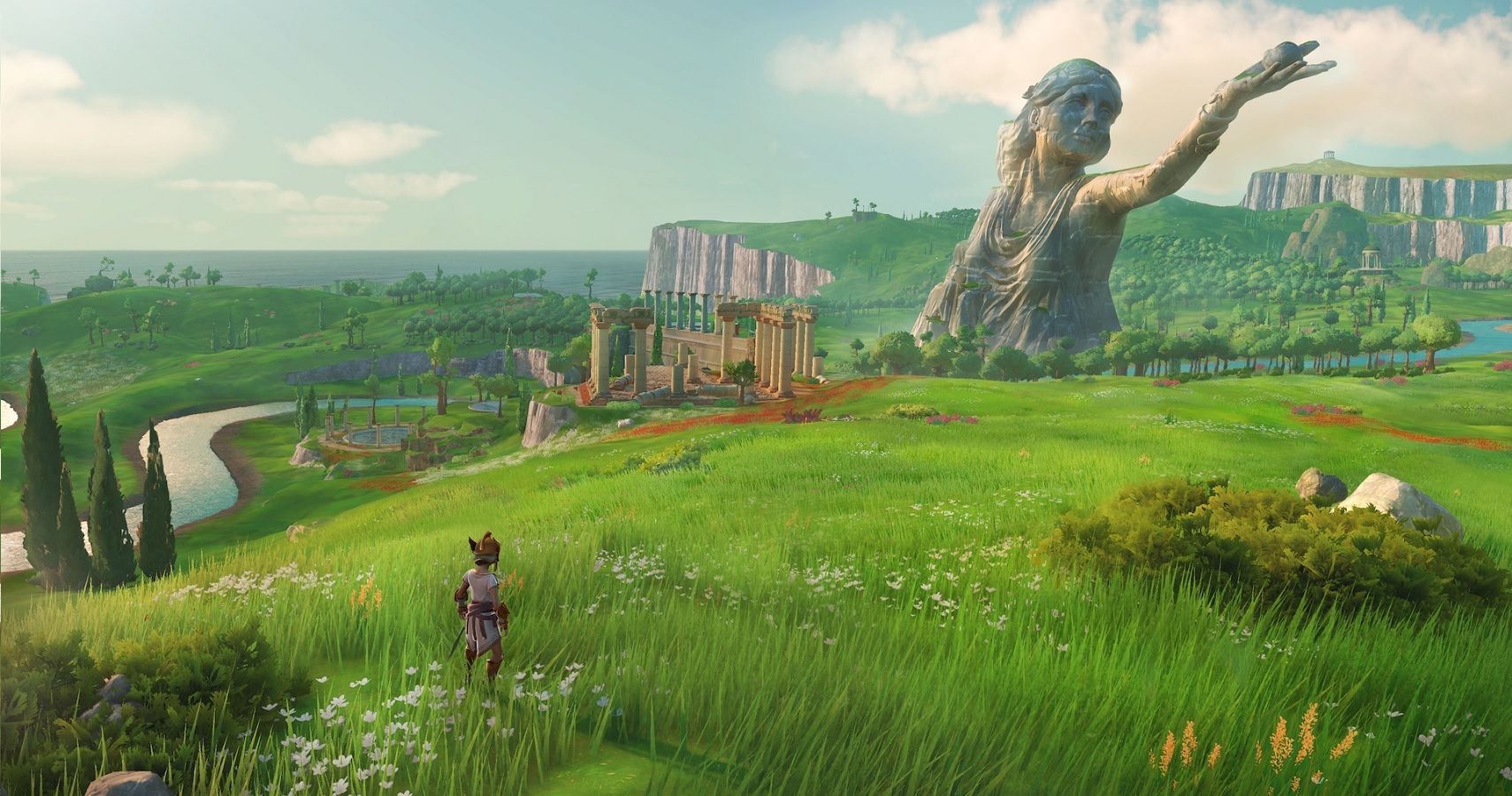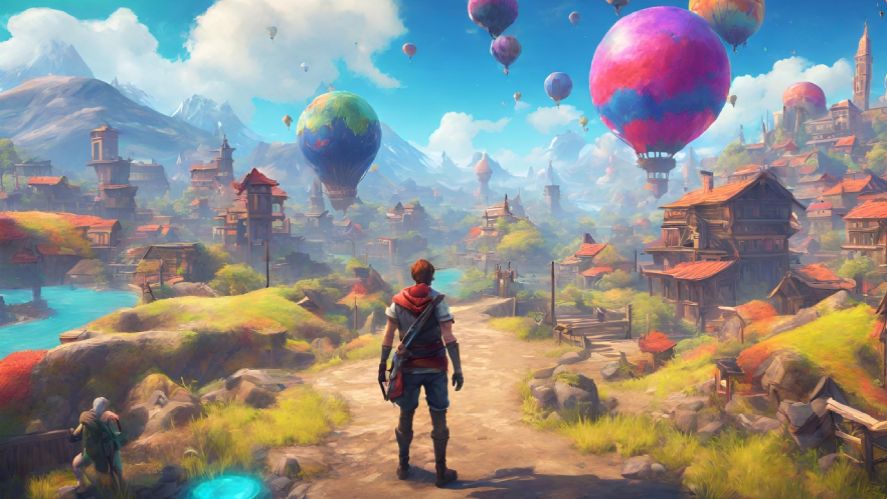
Beyond the Rails: The Allure of Open-World Adventure Games
Adventure games have always been about exploration, puzzle-solving, and narrative immersion. But the evolution of the genre has seen a significant shift towards open environments, offering players a level of freedom and agency that was previously unimaginable. No longer confined to linear pathways and predetermined sequences, players can now roam expansive landscapes, uncover hidden secrets, and forge their own paths through compelling stories. This article delves into the captivating world of open-world adventure games, exploring their defining characteristics, highlighting notable examples, and examining the unique appeal they hold for gamers.
Defining the Open World Adventure:
At its core, an open-world adventure game blends the classic elements of adventure gameplay – intricate puzzles, character interactions, and narrative progression – with the freedom and emergent gameplay of an open-world environment. Unlike purely open-world games focused primarily on sandbox mechanics, these games place a strong emphasis on storytelling and character development, using the open world as a canvas to paint a richer, more engaging experience.
Several key elements differentiate open-world adventure games from their more linear counterparts:
- Non-Linear Exploration: Players are free to explore the game world at their own pace, often with minimal restrictions on where they can go and what they can do. This allows for organic discovery and a sense of genuine adventure.
- Interconnected Systems: The game world is often designed as a complex ecosystem, with interconnected characters, factions, and events that react to the player’s actions. This creates a dynamic and believable environment.
- Emergent Gameplay: The freedom to explore and interact with the world leads to unexpected and unscripted moments, fostering a sense of player agency and making each playthrough unique.
- Meaningful Choice: Players are often presented with moral dilemmas and impactful choices that affect the story, characters, and the overall outcome of the game.
- Deep Lore and Worldbuilding: Open-world adventure games often feature rich lore, intricate histories, and well-developed cultures that contribute to the overall sense of immersion.
A Journey Through Notable Examples:
The landscape of open-world adventure games is diverse and constantly evolving. Here are a few notable examples that showcase the genre’s strengths and demonstrate its evolution:
-
The Legend of Zelda: Breath of the Wild: This groundbreaking title redefined the Zelda formula by offering a truly open Hyrule, where players can climb, glide, and explore to their heart’s content. The game encourages experimentation and rewards curiosity, with countless secrets and hidden treasures scattered throughout the world. The focus on emergent gameplay, physics-based interactions, and a minimalistic narrative approach made it a critical and commercial success.
-
The Witcher 3: Wild Hunt: Widely regarded as one of the best open-world games ever made, The Witcher 3 immerses players in a richly detailed and morally ambiguous world based on Slavic mythology. As Geralt of Rivia, a professional monster hunter, players embark on a quest to find Ciri, while also navigating complex political intrigues and personal relationships. The game’s branching narrative, memorable characters, and captivating side quests contribute to its lasting appeal.
-
Elden Ring: FromSoftware, renowned for its challenging action RPGs, took the open-world formula and infused it with their signature gameplay style in Elden Ring. The Lands Between is a vast and unforgiving world filled with formidable enemies, cryptic lore, and a sense of constant peril. While the narrative is less explicitly presented than in some other open-world games, the world itself tells a story through its environments, characters, and encounters.
-
Outer Wilds: This unique and critically acclaimed game presents players with a solar system trapped in a 22-minute time loop. As a space explorer, players must unravel the mysteries of an ancient alien civilization by exploring different planets, deciphering clues, and piecing together the truth before time runs out. The game’s focus on exploration, discovery, and scientific curiosity makes it a truly unforgettable experience.
-
Disco Elysium: While technically an isometric RPG, Disco Elysium embodies the spirit of an open-world adventure game through its emphasis on player choice, character interaction, and narrative exploration. Players take on the role of a detective with amnesia, tasked with solving a murder case in a dilapidated city. The game’s deep dialogue system, complex characters, and thought-provoking themes make it a unique and compelling experience.
-
Red Dead Redemption 2: Rockstar Games delivered a masterpiece with Red Dead Redemption 2, a sprawling Western epic that immerses players in the final days of the outlaw era. The game’s meticulously crafted world, realistic characters, and gripping story create a truly immersive and unforgettable experience. The attention to detail, from the wildlife to the weather patterns, makes the world feel alive and believable.
The Appeal of Open-World Adventures:
The allure of open-world adventure games lies in their ability to provide a sense of freedom, agency, and immersion that is unmatched by more linear experiences. Here are some key reasons why these games resonate so strongly with players:
- Freedom of Choice: The ability to explore the world at your own pace and make meaningful choices that affect the story empowers players and creates a sense of ownership over their experience.
- Discovery and Exploration: The thrill of discovering hidden secrets, uncovering forgotten lore, and charting your own path through the world is a powerful motivator for players.
- Emergent Storytelling: The unscripted moments and unexpected encounters that arise from the open-world environment create unique and memorable stories that are personal to each player.
- Character Development: The freedom to interact with the world and its inhabitants allows players to develop their characters in a way that feels authentic and meaningful.
- Immersion and Escapism: The richly detailed environments, compelling narratives, and interconnected systems of open-world adventure games create a sense of immersion that allows players to escape into another world.
- Replayability: The vastness of the world, the branching narratives, and the emergent gameplay possibilities make open-world adventure games highly replayable, offering players countless hours of entertainment.
Challenges and Future Directions:
While open-world adventure games offer a wealth of possibilities, they also present significant challenges for developers. Creating a vast and engaging world, filling it with meaningful content, and ensuring that it remains cohesive and immersive requires a significant investment of time, resources, and creativity.
Some common challenges include:
- Content Bloat: Open worlds can sometimes feel empty or repetitive if they lack meaningful content and interesting activities.
- Performance Issues: The sheer scale of open-world games can often lead to performance issues, such as frame rate drops and glitches.
- Narrative Coherence: Maintaining a cohesive and engaging narrative in an open world can be challenging, as players are free to deviate from the main story at any time.
- Balancing Freedom and Structure: Striking the right balance between freedom of exploration and narrative structure is crucial to creating a satisfying experience.
Looking ahead, the future of open-world adventure games is bright. As technology continues to advance, we can expect to see even more immersive and dynamic worlds, more sophisticated AI, and more seamless integration of narrative and gameplay. Virtual reality and augmented reality technologies hold the potential to further enhance the sense of immersion and create truly unforgettable experiences.
The open-world adventure genre is a testament to the power of interactive storytelling and the enduring appeal of exploration and discovery. By blending the classic elements of adventure gameplay with the freedom and emergent possibilities of open environments, these games offer a unique and compelling experience that resonates with players on a deep level. As technology continues to evolve, we can expect to see even more innovative and immersive open-world adventures in the years to come, pushing the boundaries of what is possible in interactive entertainment. They offer a chance to lose ourselves in vast landscapes, forge our own destinies, and become the heroes (or anti-heroes) of our own unique stories.

